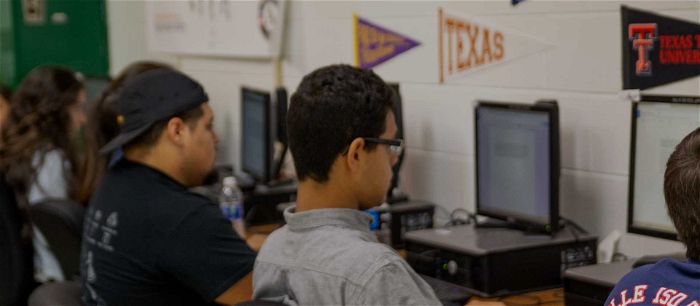Early college high schools blend high school and college coursework in a rigorous yet supportive program, putting students on a clear path to college success by high school graduation. The schools are designed so that low-income youth, first-generation college goers, English language learners, students of color, and other young people underrepresented in higher education can simultaneously earn a high school diploma and at least a semester of transferrable college credit—tuition free.
Here is a success story from a Dayton Early College Academy graduate, who now teaches at the same school:
Cierra Swopes has a unique perspective on early college high school. In 2008, she was a member of the Dayton Early College Academy’s second graduating class. And last year, Cierra got the job of her dreams: teaching chemistry at this nontraditional charter high school in Dayton, Ohio.
“As an early college student, I was privileged enough to graduate from high school with an Associate’s degree,” says Cierra, who started taking college courses at Sinclair Community College during her freshman year at DECA, when she was only 13 years old. That experience, she says, was a bit intimidating at first, but she quickly adjusted with the support she got from her DECA teachers.
After graduating from DECA, Cierra went on to Miami University about one hour away, where she earned a bachelor’s degree in chemistry and earth science education.
“I’ve always wanted to be a teacher since first grade,” Cierra says. “That career goal never changed for me.” And today she works alongside the very DECA teacher, now a curriculum specialist for chemistry, who gave her so much encouragement in her student days.
Supportive relationships define the DECA experience, both for students and teachers. All DECA teachers also serve as advisors. “I didn’t appreciate how much my DECA advisor did for me until I became an advisor myself for 13 students,” says Cierra. “Being an advisor has been the highlight of teaching here. You advocate for students, encourage them, and walk through their trials and tribulations with them.”
Since it opened in 2003, DECA has prepared young people to become the first in their families to go to college. With 425 students, the school is a unique partnership of the DECA Board, the Dayton Public Schools, the University of Dayton, and Sinclair Community College. Its mission is to serve young people who are underrepresented in higher education, unprepared academically to meet college-readiness standards, and unable to pay for college. All its students live in Dayton, and nearly 76 percent are economically disadvantaged.
Cierra found that DECA offers a more individualized education than she had experienced in public school and at a charter middle school. “I could challenge myself instead of sitting in a classroom not being encouraged. I could excel at things that I enjoyed.”
For her students today, Cierra knows that chemistry “can be a struggle, but some of them have taken an interest and may pursue it at a higher level.” For struggling students, Cierra and other DECA advisors may recommend tutoring, but even more important support comes from other students, who all hold one another accountable. “If they notice a student is falling behind in class, they keep one another up and keep them from falling too far,” says Cierra. “They care about each other enough to bring each other up.”
The key to how students engage with one another and in their classes is JFF’s Common Instructional Framework, a set of proven instructional strategies and protocols that guide Cierra and other DECA teachers in everything they do at the school. Used consistently across all DECA classes, the strategies, such as Collaborative Group Work, enable every student to master high-level academic content. And the students appreciate that every teacher relies on the same set of strategies. As Cierra explains, “The kids know exactly what to expect, and everyone knows what to do.”
The result? “Participation in class here is a lot higher,” says Cierra, comparing the depth of the students’ engagement at DECA with what she saw at the suburban school where she did her student teaching. “Students actually feel that they’re a part of the class. The class is as much theirs as it is mine. They get to be an active part of class every day.”
Living her lifelong dream every day is something Cierra says DECA made possible:
“Going to an early college, especially in an urban environment, opened up doors for me that were previously closed. In urban areas, it’s not common to talk about college or plan beyond high school. When kids start talking about college as a freshman in high school, it’s a new topic. By their senior year at DECA, it’s all they talk about. As a freshman, college seems beyond their goals, but as a senior, it’s their future. Many would not have even considered it possible.”
Jobs for the Future’s Early College Design Services builds on more than a decade of experience as a strategic partner with school districts. JFF helps district leaders assess challenges and identify and implement cost-effective school designs, practices, and professional development tailored to local needs.
Read more Impact Profiles


